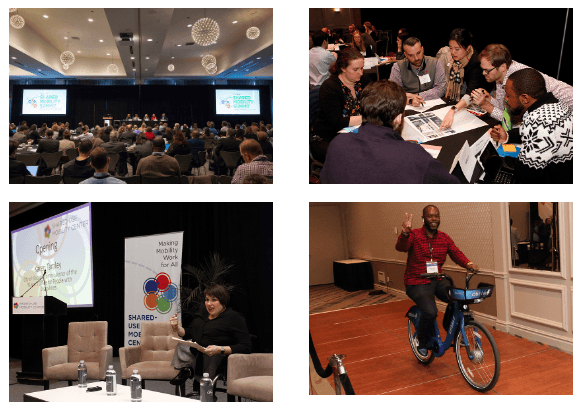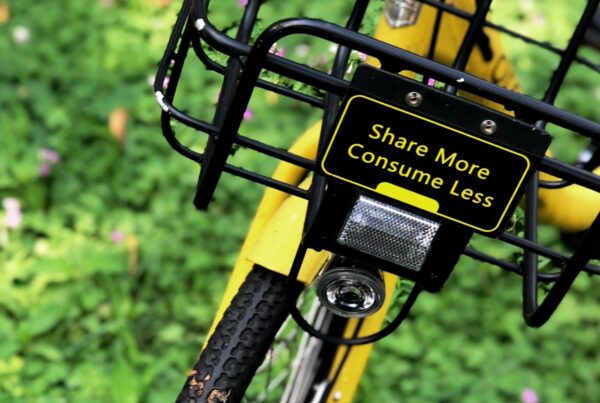Welcome to the Shared-Use Mobility Center’s weekly guide to the most impactful news, thought-provoking articles and innovative technologies that are shaping our transportation future. We believe in sharing information, just like sharing cars, bikes, and scooters, so if there’s anything additional you’d like to see, just drop us a line.
Announcements
National Shared Mobility Summit
March 17 – 19, 2020 | Hyatt Regency McCormick Place, Chicago
All this is less than 60 weekdays away.
Topics include:
New Approaches to Goods Delivery
Insight from Shared Mobility Pilot Pioneers
Universal Mobility
Comprehensive Planning for Mobility
Latest Learnings from the FTA
Sustainable Strategies for Climate Action
Innovative Transit Programs
Data sharing for Mobility as a Service (MaaS)
Vision Zero Strategies for All Modes
Autonomous Shuttles and Transit
Rural Shared Mobility
Business Models for Mobility Solutions
What’s Making Transit Work Today?
Law, Equity, and Environmental Justice
Equitable Technology for the Public Way
New Payment Models for MaaS
Transit Agencies Integrating Bikeshare
Funding for the Public Sector
Land Use Policies For Mobility
And more!
NEW MICROTRANSIT RFP IS A MILESTONE FOR THE MOBILITY ON DEMAND (MOD) ON-RAMP PROGRAM
The Maryland Transit Administration has issued an RFP for a Microtransit Service Planning and Delivery project. As part of the MOD On-Ramp Program, SUMC has provided technical assistance to the MDOT/MTA in developing this project. This innovative RFP proposes a 2-year microtransit service pilot to improve transit operations and increase access to opportunities. We are excited to see it take shape. View the MDOT/MTA’s RFP here and below.
Ridehailing/Carsharing/Carpooling
Uber is overhauling the entire experience for California riders and drivers in reaction to the UB5 gig-work law. At stake: hundreds of millions of dollars and the future of ridehailing in the state.
Hyundai’s new MoceanLab carsharing service in LA will be adding 300 Ioniq and Kia electric vehicles to its fleet, a large boost from the initial launch last year of 15 plug-in hybrids.
A new partnership in Quebec will pool the resources of EV taxis company Taxelco and smart transportation platform Netlift to streamline taxi operation—along with carpooling, parking, and smart payments tech—for all taxis throughout the region.
Uber has a new safety feature in the US and Canada that gives riders the option of using a verified PIN to make sure they are getting in the right car. The feature can be enabled for every ride or only on late-night trips.
Partnerships and Programs
USDOT Secretary Elaine Chao announced a new set of autonomous vehicle guidelines, AV 4.0, that focuses on safety for all, promoting efficient markets, and coordinating policies and regulations. Let’s make sure equitable access to self-driving technology doesn’t get lost in the shuffle.
Cubic and Moovit are teaming up to help integrate mobility fare technology and mobility-as-a-service features into one convenient platform for multimodal trip planning and ticketing.
Columbus, OH’s Linden neighborhood will have a 12-person, self-driving shuttle operating between a transit hub and local community centers starting this month as part of the Smart Columbus mobility grant program.
The Worcester Regional Transit Authority in Massachusetts will pilot an on-demand microtransit service in Westborough with ridehailing company Via thanks to new funding from MassDOT.
Bikesharing and Micromobility
Lime has released some data on its operation in the Chicago dockless scooter pilot that ended last October, and CTA Blue Line stops were some of the most popular spots for ending a trip.
But even with micromobility programs helping with some first/last mile trips, how does the future look for growth in the volatile dockless scooter market? Not very good for Lime, it seems.
We completely agree, Streetsblog CHI. Cyclists and those who want to traverse Chicago’s streets without driving a car need more protected space and safety features that will help make the city’s transportation system more sustainable.
How have micromobility services changed and morphed in 2019? Check out the ups, downs, and breakdown of the scooter and bikeshare revolutions by Ashwini Chhabra, the Senior Director of Public Affairs at Bird.
Transit
Houston’s Metro is studying free fares for its bus and train system in order to boost ridership and calm regional traffic woes. This would make the city the largest in the US to have free transit if it moves ahead.
New Chicago DOT head Gia Biagi is already focusing on making Chi’s streets safer and transit quicker while keeping an eye on opportunities for sustainable road space opportunities such as congestion pricing.
Between 2010 and 2019, 1,200+ miles of expanded or new transit lines were added in the US, according to analysis from urban researcher Yonah Freemark. While this shows an overall upward trend in increasing public transportation options, the question remains: is this expansion enough to fill coverage needs?
In a car vs bus showdown, a CBC Vancouver reporter raced against a colleague using the city’s new TransLink RapidBus lines to a SkyTrain station. The bus won.
Technology
Autonomous tech company Mobilieye recently tested a self-driving car that wove through the streets of Jerusalem, using only 12 cameras with no LIDAR in sight. Read more about the project and catch a video of the cruise on The Verge.
At CES, Toyota announced it will plan to build a ‘prototype city of the future’ that will test smart, digital infrastructure and develop emerging technologies and systems for cities, including connected and electric autonomous vehicles and shared mobility.
The Southern Nevada RTC has partnered with the Transit app to allow mobile fare purchases, uses, and multimodal trip planning for the Las Vegas area. That isn’t all though, you can now get the same mobile fare payment experience in the Uber app as a result of a collaboration with fare payment tech company Masabi.
Urban Sustainability
The city of Oslo had zero pedestrian and cyclist deaths in 2019, a great achievement thanks to bold initiatives that turned major streets into car-free zones, enacted congestion pricing in the metro center, and replaced almost all on-street parking with bike lanes and sidewalks. We hope to see these developments happen in cities all around the world so Vision Zero can become a reality everywhere.
Read about the latest amendments and changes to the SB 50 affordable housing and zoning bill and what that means for the future of sustainable communities in California from State Senator Scott Wiener on Medium.
The rules of the road are quickly moving from the paint on our streets to code in the cloud, and cities need to speed up the digitization of urban guidelines and policies to manage the split-second decisions made by our new-age transportation networks. The Open Mobility Foundation’s Mobility Data Specification helps to bridge that gap.
The National Highway Traffic Safety Administration has been on a victim-blaming kick recently on social media but transportation safety advocates and followers were quick to shut down the message using the NHTSA’s own data to show that the focus should be on the real culprits: SUVs and pickup trucks.
Requests for Proposals, Inquiries, and Information
RFI: Inclusive Design Challenge
U.S. Department of Transportation
Washington D.C.
Deadline: January 30, 2020
RFP: Microtransit Service Planning & Delivery
Maryland Transit Administration
Baltimore, MD
Deadline: February 12, 2020
RFP: Accelerating Clean Transportation Now (ACTNow)
Massachusetts Clean Energy Center
Boston, MA
Deadline: March 3, 2020
Did someone forward this to you? You can sign up for our newsletter here.







